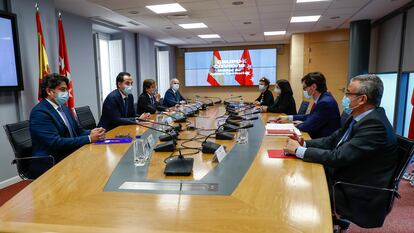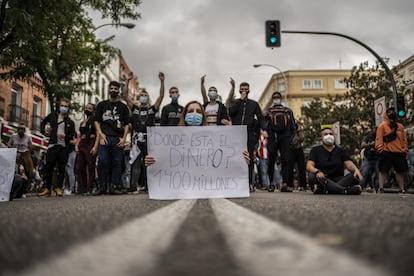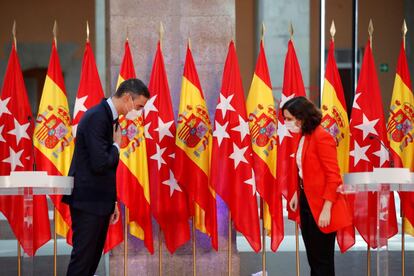Spanish government pressures Madrid to take tougher action against Covid-19 epidemic
The executive wants the regional premier to leave more decisions in the hands of her health team

Spain’s central government has decided to indirectly take charge of the health crisis in the Madrid region, which is once again the epicenter of the Covid-19 epidemic in the country.
Although powers over healthcare are devolved to the regions and Prime Minister Pedro Sánchez of the Socialist Party (PSOE) has pledged not to declare another national state of alarm like the one that kept Spaniards confined between mid-March and mid-June, the central executive is pressuring Madrid premier Isabel Díaz Ayuso to adopt tougher measures against the spread of the virus.
Díaz Ayuso, of the conservative Popular Party (PP), is being asked to leave key decisions on Covid-19 management in the hands of her health chief and other health department experts, with whom the central government is in close contact.
On Monday, selective confinements went into effect in 37 health areas located within the Spanish capital and several other towns in the Madrid region with very high rates of infection. Local residents have staged street protests against what they see as unfair targeting of low-income neighborhoods. Although Díaz Ayuso has long resisted the idea of a broader region-wide confinement, Madrid government sources said that she is now more open to stricter measures.

Spain’s Health Minister Salvador Illa on Tuesday suggested that the central government wants a bigger role in handling the Madrid health crisis, while avoiding an open confrontation with the regional premier.
Speaking on SER radio station, Illa said that all Madrileños, and not just the residents of the confined areas, should stay home save for essential business. Madrid Mayor José Luis Martínez Almeida, of the PP, backed this statement: “I would follow the minister’s advice.”
Until now, according to sources from both the central and regional governments, Díaz Ayuso and her close aides had been blocking all attempts at stricter measures to control the spread of the coronavirus in the region, where incidence over the last 14-day period now stands at 746 cases per 100,000 inhabitants, or 2.6 times the Spanish average. The region is also dealing with the highest pressure on its healthcare system, with a quarter of its beds occupied by Covid-19 patients.
According to data published on Tuesday by the regional government, 16 additional health areas in the region have a Covid-19 incidence rate above 1,000 cases per 100,000 inhabitants. Díaz Ayuso has suggested that restrictions on mobility may need to be extended beyond the current areas.
Request for help
On Monday, Díaz Ayuso met with the Spanish prime minister after publicly asking the central government to get “actively involved” in the fight against the coronavirus. The move marked a change in attitude after the Madrid administration had claimed for months that the national lockdown had not allowed regional authorities to effectively deal in heir own way with the crisis.
According to sources in the central executive familiar with the contents of Monday’s meeting, Díaz Ayuso has finally acknowledged that the situation in Madrid is very serious and that she needs to give more power of decision to the regional health chief, Enrique Ruiz Escudero.

While other regions of Spain with high coronavirus incidence, like Aragón or Catalonia, quickly introduced partial or local lockdowns on the advice of their own health teams, Madrid has been the exception. In Madrid, there has been a clear disconnect between the health department chief and the regional premier. Last week, Díaz Ayuso also discredited statements by the deputy health chief, Antonio Zapatero, regarding imminent confinements in Madrid – even though the confinements were ultimately approved.
These kinds of internal clashes are not new. In May, during the first wave of the Covid-19 pandemic, Madrid’s chief of public healthcare, Yolanda Fuentes, walked out on the job after her warnings about Madrid’s lack of preparedness for a potential second wave went unheeded.
But now, central and regional sources agree that Díaz Ayuso is ready to give her health officials more leeway. Technical meetings between specialists from both administrations are already underway.
Sources in the Madrid executive said that Díaz Ayuso is now resigned to the fact that the current containment measures are insufficient and that stricter ones will need to be introduced. The decision to isolate 37 high-incidence areas was described as “a surgical procedure” meant to save the Madrid economy from a complete confinement, which Díaz Ayuso last week said would be “death for our region.”
English version by Susana Urra.
Tu suscripción se está usando en otro dispositivo
¿Quieres añadir otro usuario a tu suscripción?
Si continúas leyendo en este dispositivo, no se podrá leer en el otro.
FlechaTu suscripción se está usando en otro dispositivo y solo puedes acceder a EL PAÍS desde un dispositivo a la vez.
Si quieres compartir tu cuenta, cambia tu suscripción a la modalidad Premium, así podrás añadir otro usuario. Cada uno accederá con su propia cuenta de email, lo que os permitirá personalizar vuestra experiencia en EL PAÍS.
¿Tienes una suscripción de empresa? Accede aquí para contratar más cuentas.
En el caso de no saber quién está usando tu cuenta, te recomendamos cambiar tu contraseña aquí.
Si decides continuar compartiendo tu cuenta, este mensaje se mostrará en tu dispositivo y en el de la otra persona que está usando tu cuenta de forma indefinida, afectando a tu experiencia de lectura. Puedes consultar aquí los términos y condiciones de la suscripción digital.








































